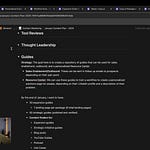This video covers the basics of SEO and how to create a content strategy using keywords.
Here's a quick summary:
Understanding SEO: SEO (Search Engine Optimization) helps bring organic, unpaid traffic to your website. There are essentially two types of search results: sponsored (paid) and organic.
SEO is about getting your content to rank in the organic section.Keywords and Intent: Keywords are the terms people type into search engines. They reveal the intent behind a search, such as what the user wants to know, do, or buy.
Short keywords (e.g., "content marketing") and long-tail keywords (e.g., "most popular content marketing trends in 2024") both play roles in SEO. *Long-tail keywords are becoming more relevant due to the rise of voice search.Content Types by Funnel Stage:
Top of the Funnel (ToFu): This content answers basic "what" questions (e.g., definitions, benefits, mistakes to avoid) and is very educational. It's aimed at attracting a broad audience looking for information.
Usually high in volume but high in difficulty to rank for
Middle of the Funnel (MoFu): Focuses on "why" questions, addressing the motivations or reasoning behind certain topics. Thought leadership content is common here, often distributed via social media or paid ads.
Often not made to rank, but attached to high-ranking TOFU content or distributed on other channels (guest posts, email, social media, etc.)
Now when these are video-based, you can make tons of thought leadership content for distribution from the transcript with AI
Bottom of the Funnel (BoFu): Answers "how-to" questions, showing how to solve specific problems with your specific product. These guides are tailored to help users who are closer to making a purchase decision.
We create these from sales calls since our human reps walk prospects through these types of problems all day, every day.
SEO Strategy: The goal is to align content with the user's intent revealed by the keywords. Top-of-the-funnel content is used to attract higher traffic volumes, while middle and bottom-of-the-funnel content targets more specific, lower-volume searches that are likely to convert better.
The series will continue with more details on how to find the right keywords, and how that informs SEO and the type of content you create for your overall content strategy.













Share this post